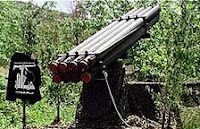
Hizbullah has the ability to launch rockets against any point in Israel, the organization's leader, Hassan Nasrallah said on Sunday.Hizbullah doesn't have the capability to produce these rockets and missiles on its own. It requires the aid and support of others - Iran and Syria. Both those countries are using Hizbullah to further their own goals in the region, and destabilizing Lebanon and fighting Israel are chief among them.
He told Al Jazeera that Hizbullah had the capability to strike every part of Israel during last summer's war, and retains that capability.
"Even in the months of July and August 2006 there was not one place in occupied Palestine that we could not reach, every point and every corner," Nasrallah was quoted as saying. "I stress that we can do this today as well."
The full interview is due to be broadcast by the Qatari-based satellite television on Monday.
Meanwhile, Hizbullah guerrillas have moved most of their rockets in south Lebanon among civilians in villages, an apparent attempt to avoid detection by Israel and UN troops, Israeli military officials said Sunday.
Still, this indicates quite a bit of puffery on Nasrallah's part since they weren't actually able to fire rockets into all parts of Israel, whether it was into Tel Aviv or Jerusalem. It isn't clear whether it was because of a lack of weapons or because should they have succeeded in hitting Tel Aviv or Jerusalem, the Israeli response would have been overwhelming and crushing to Hizbullah. I lean to towards the former because had Hizbullah had the weapons, they would have used it or else possibly seen it destroyed by Israeli forces operating against them inside Lebanon.
Also, Hizbullah is simply reorganizing north of the Litani River with longer range missiles - both to avoid being in the UNIFIL areas proper, and to bring more civilians in Lebanon into range of Israeli counter battery fire. Realigning its forces North of the Litani makes sense if Hizbullah has longer range weapons because they can simply fire into Israel from further away and avoid the UNIFIL positions between the Litani and the Israeli border.
Meanwhile, Islamic Jihad continues its kassam attacks against Israel. An eight month old Israeli baby was among those injured in the latest rocket attacks, which landed South of Ashkelon.
UPDATE:
Syria appears to have learned lessons from last summer's war between Hizbullah and Israel. They're busy focusing on long range missiles with which they can hit strategic and civilian targets deep inside Israel, negating Israel's advantages on the battlefield.
Taqi said Syria took an important lesson from last summer’s war between Hizbollah and Israel: The Israeli rear is vulnerable to long-range artillery rockets. Hizbollah fired some 4,000 rockets in 33 days of intense fighting that battered the Israel Defense Force and damaged its ability to deter others.Israel would not tolerate such a situation, and it is possible that Syria's Assad would trade land to fight an insurgency much as the Ba'athists did in Iraq against the US and coalition forces. This might leave Syria and Damascus devastated, but Israel would still be in harm's way from ongoing rocket attacks, much as Southern Israel remains threatened from kassams fired from Gaza.
One Syrian defense official said Syria would avoid a direct, classic war with Israel, seeking instead a guerrilla conflict on the front lines while firing rockets and ballistic missiles at strategic and civilian installations.
Syria has Soviet-made SS-21 missiles and has built a large arsenal of Scud ballistic missiles, the D variant with a 700-kilometer range. Syria also builds artillery rockets of various calibers ranging from 122mm to 240mm, and has bought other types from Russia and Iran with ranges up to 200 kilometers.
“The next possible Syrian-Israeli war will be more like a war of cities rather than battles on fronts or in the fields,” the Syrian defense official said. “It’ll be a war of attrition that Israelis are not good at.”
No comments:
Post a Comment